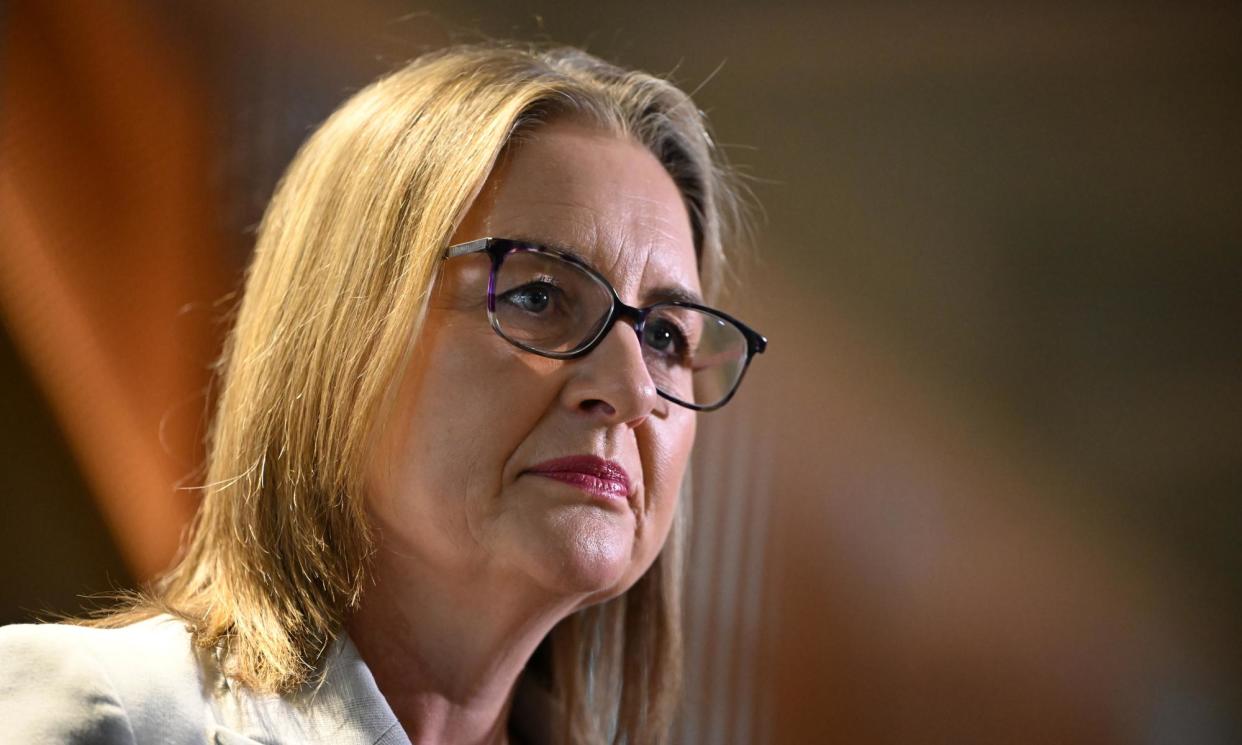If Jacinta Allan isn’t Daniel Andrews, her first budget should show Victorians exactly who she is

In the seven months since Jacinta Allan took over as Victoria’s premier, she’s worked to shirk off the impression she’s Daniel Andrews’ apprentice and differentiated herself from the former leader.
By all accounts, Allan has moved away from the centralised model that characterised the Andrews leadership and drew criticism from integrity agencies. Her cabinet meetings are said to be more consultative and her ministers have been given autonomy over their portfolios and, as a result, more visibility in the media.
As one minister put it: “She’s not making us do all the work and then taking all the credit for it.”
On the policy front, Allan also has taken a markedly different approach from Andrews.
One of her first acts as leader was to ignore a government-led inquiry’s recommendation to ban duck hunting in the state. The ban was supported by the majority of the Labor caucus and several crossbenchers the government has come to rely on in the upper house, including Animal Justice’s Georgie Purcell, who described it as the “ultimate betrayal”.
Related: Jacinta Allan dumps Victorian Labor MP from caucus after fresh allegations emerge
Allan has also ditched proposed changes to youth bail in favour of a trial of ankle bracelets and scrapped plans to open a second injecting room in Melbourne’s CBD. Both were met with praise from News Corp papers, who said the shift away from the Andrews policy agenda would score her political points.
But this ignores the fact that the former premier’s ability to balance socially progressive policies with a huge infrastructure agenda saw him win three elections – picking up additional lower-house seats in 2018 and 2022.
“All this fawning about her not being Dan ignores the fact he was popular. Sure, the papers didn’t like him, but the voters did,” one Labor MP told Guardian Australia.
Another MP said Andrews’ approach had successfully suppressed the Green vote in Labor seats such as Albert Park, Footscray and Northcote.
“You have to worry about those more socially progressive voters that we have managed to keep on side for years, what these sorts of decisions will mean for them,” they said.
But those close to Allan argue Andrews had avoided tackling the issues in his final months.
“If he wanted to make a decision on any of these issues, Daniel could have,” one minister said, noting the Ken Lay report which recommended the injecting room had been sitting with the government since June 2023, well before his resignation.
Most Labor MPs, however, appear agitated for Allan to begin to steer her own course as leader.
While she’s already flagged an interest in women’s health and tackling family violence, they point to next week’s budget – her first as premier – as the perfect vehicle to show Victorians her priorities.
Much like last year’s budget, there have been no early announcements from members of the government, who are again forewarning it will be “tough”, “challenging”, “difficult” and “very, very tight”.
While a surplus remains in sight and the state has received an extra $3.7bn from the commonwealth via GST payments, the most recent budget update in December showed net debt was set to hit $135.5bn this year and will continue to grow to $177.8bn by 2026-27. (By way of comparison, NSW’s net debt is set to hit $94.8bn this year and $118bn in 2026-27).
Infrastructure is the main driver behind Victoria’s debt, thanks in part to cost overruns on projects such as the North East Link, which the government last year announced was $10bn over budget.
The government has also committed $3.6bn to the suburban rail loop, a project Andrews announced just prior to the 2018 election and which Labor has remained committed to since, despite not knowing how much the entire project will cost.
While the treasurer, Tim Pallas, has said he won’t reveal the contents of his 10th budget until Tuesday, he’s already ruled out wholesale increase in taxes to pay the debt off, instead pointing to trimming back “extraordinary” financial support provided during the pandemic in areas such as health and education.
He’s also suggested the government will slow down its infrastructure spending due to concerns it has contributed to a rise in building costs across the state.
“We recognise that level of expenditure is crowding out private sector investment, and we will moderate it over time,” Pallas told question time on Wednesday.
It’s not yet clear if the loop will be included in this slowdown. But it appears Pallas has listened to the experts, who had warned the government’s plan to build 800,000 homes over the next decade would be hard to deliver when competing with the “big infrastructure build”.
Allan has been more reserved, perhaps letting her treasurer sell his budget. She’s repeatedly told reporters she won’t preempt what’s in the budget, though in question time on Thursday she reaffirmed her commitment to the housing target.
Pallas, meanwhile, told the chamber the housing crisis could be the “defining issue of this time”.
With housing the number one issue among Gen Z and millennials, who are now outnumbering baby boomers on the electoral roll, perhaps Allan has found her issue to keep the Greens at bay.

 Yahoo News
Yahoo News 
